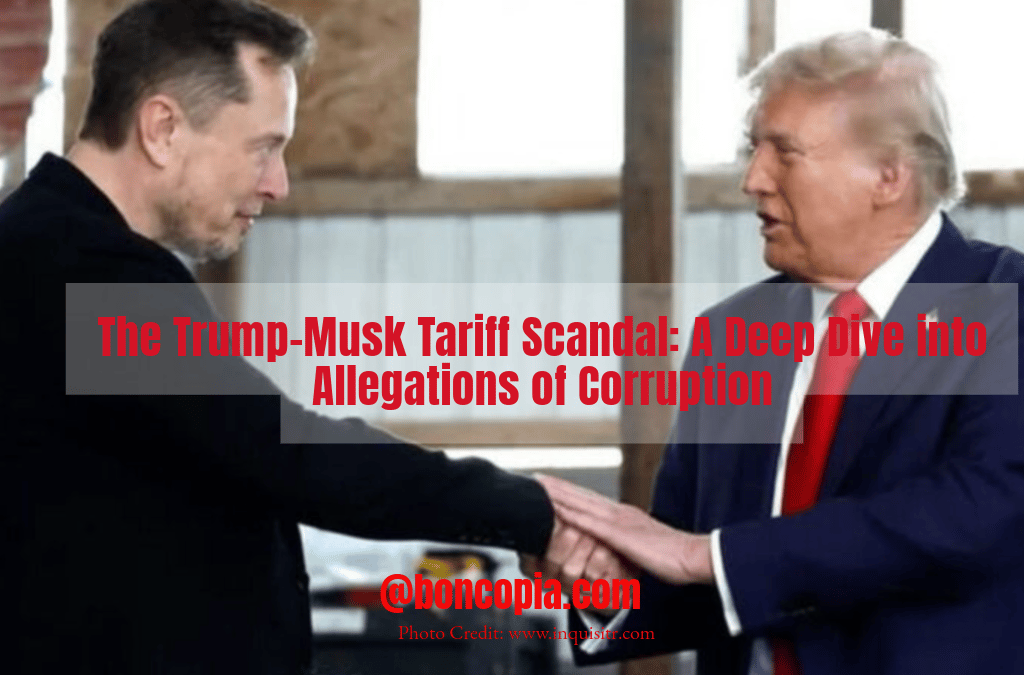The Trump-Musk Tariff Scandal: A Deep Dive into Allegations of Corruption
5/26/20253 min read


The Trump-Musk Tariff Scandal: A Deep Dive into Allegations of Corruption
In a startling revelation that has sent shockwaves through the political landscape, Representative Greg Casar, a Democrat from Texas, has called for a massive corruption probe into what he describes as a "really serious allegation." The claim? That former President Donald Trump and billionaire entrepreneur Elon Musk orchestrated a tariff scam, where countries dodged U.S. tariffs by signing lucrative contracts with Musk's companies. This explosive accusation, detailed in a recent interview on "The Daily Mic Drop," has ignited a firestorm of controversy and raised critical questions about the intersection of politics, business, and ethics.
The Allegations Unpacked
The core of Casar's concern lies in the potential misuse of tariff policies during Trump's administration. According to the representative, Trump threatened massive tariffs on various countries, only to see those same nations sign contracts with Musk's enterprises, such as Starlink, as a means to mitigate the financial burden of these tariffs. This pattern, Casar argues, suggests a deliberate strategy to enrich Musk at the expense of American consumers and international relations.
Casar's call for investigation is not isolated. He is joined by fellow Democrats, including Representative Gabe Amo and Senator Chris Murphy, who are equally alarmed by the implications of such a scheme. The allegations point to a broader issue of crony capitalism, where personal and business interests allegedly influenced national policy, potentially costing consumers thousands of dollars annually in increased prices for goods.
The Context of Trump's Tariff Policies
To understand the gravity of these claims, it's essential to consider the broader context of Trump's tariff strategies. Since assuming office, Trump imposed tariffs on over 180 countries and territories, a move that cybersecurity experts and economic analysts have warned could foster scams and misinformation. The Yale Budget Lab's research indicates that these tariffs have led to an increased average effective tariff rate, the highest since 1934, significantly impacting global trade dynamics.
The economic fallout from these tariffs has been substantial. Reports suggest that they amount to an average tax increase of nearly $1,200 per U.S. household in 2025 alone. This financial burden, coupled with the allegations of a tariff dodge scheme, paints a picture of policy decisions that may have prioritized personal gain over national interest.
Musk's Role and the Shifting Dynamics
Elon Musk's involvement in this narrative is particularly intriguing. Once a frequent ally and beneficiary of Trump's administration, Musk's relationship with the former president appears to be cooling. Recent analyses, such as those from Politico, note a sharp decline in Trump's mentions of Musk on Truth Social, from an average of four times a week in February and March to zero since April. This shift could be indicative of a strategic retreat, possibly in response to the mounting allegations and the political risks they pose.
Musk's silence during critical meetings and his reduced visibility in Trump's orbit suggest a complex dance of power and influence. Despite remaining close to Trump and maintaining access to the West Wing and the Pentagon, Musk's role seems to be undergoing an "inexorable tapering off," as described by political observers. This dynamic raises questions about the sustainability of their alliance and the potential fallout from the corruption probe.
The Political Ramifications
For Democrats, this scandal presents a golden opportunity to reignite their "culture of corruption" narrative, a strategy that proved effective in the 2006 midterms. By focusing on transparency and accountability, Democrats aim to resonate with voters disillusioned by perceived ethical lapses in the previous administration. Casar's push for a corruption probe aligns with this broader agenda, positioning him as a champion of reform and a critic of the alleged cronyism between Trump and Musk.
The timing of these allegations is crucial, coming as it does ahead of midterms where voter enthusiasm and trust in political institutions are at stake. Democrats are likely to leverage this narrative in attack ads and campaign messaging, portraying Musk as a symbol of the excesses of billionaire influence in politics. This approach could sway working-class voters, a demographic that Casar believes can be won back through a commitment to combating corruption.
The Road Ahead
As the investigation into these allegations unfolds, the coming weeks and months will be critical. The outcomes could shape future policies on international trade, governance, and the relationship between business and politics. For now, the focus remains on gathering evidence, substantiating claims, and determining the extent of any wrongdoing.
Rep. Casar's commitment to transparency and accountability underscores the importance of such probes. As a member of Congress, he has a responsibility to ensure that allegations of corruption are thoroughly examined, regardless of the political or personal implications. The results of this investigation could have far-reaching consequences, not just for Trump and Musk, but for the integrity of the U.S. political system as a whole.
Thought Questions
How might the alleged Trump-Musk tariff scam impact public trust in political and business leaders?
What are the potential economic consequences for American consumers if these allegations are substantiated?
How should the relationship between government policy and private business interests be regulated to prevent similar scandals in the future?
Could this investigation influence the outcome of upcoming midterms, and if so, in what ways?
What role does media coverage play in shaping public perception of such high-profile allegations?
hello@boncopia.com
+13286036419
© 2025. All rights reserved.